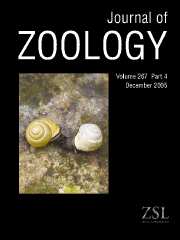Article contents
Condition and fecundity of translocated rock-dwelling cichlid fish in Lake Malawi
Published online by Cambridge University Press: 01 March 1998
Abstract
The condition factor and fecundity of the translocated rock-dwelling cichlid fish, Cynotilapia afra, Pseudotropheus callainos, and Pseudotropheus tropheops ‘red cheek’ at Thumbi West Island, southern Lake Malawi, were compared with those at their sites of origin, in the north of the lake. The guiding hypothesis was that these species, having originated from a region of the lake which is generally poor in nutrients, and been introduced to an area richer in nutrients, would be in better condition and more fecund there than at their sites of origin. That seemed to be the case. P. callainos and P. tropheops ‘red cheek’ had significantly higher condition factors and fecundity indices at Thumbi West Island than at their sites of origin. However, both condition factor and fecundity of all the species studied fluctuated seasonally. The major peaks in condition factor coincided with either the wind-induced lake upwelling from June to August, or the rains. Major peaks in fecundity occurred at the end of the rainy season, between February and April, or at the end of the upwelling period between September and October. The translocated species began to breed at a smaller size at their sites of origin in the north than at Thumbi West Island, probably as an adaptive response to a poor nutrient regime in the north.
The increase in population of some translocated species can be partly attributed to their improved condition and fecundity due to enhanced nutrient availability at the site where they have been introduced. This may have negative implications for the native taxa, more particularly as competition for breeding space is rife among the rock-dwelling cichlids of Lake Malawi.
- Type
- Research Article
- Information
- Copyright
- © 1998 The Zoological Society of London
- 8
- Cited by


